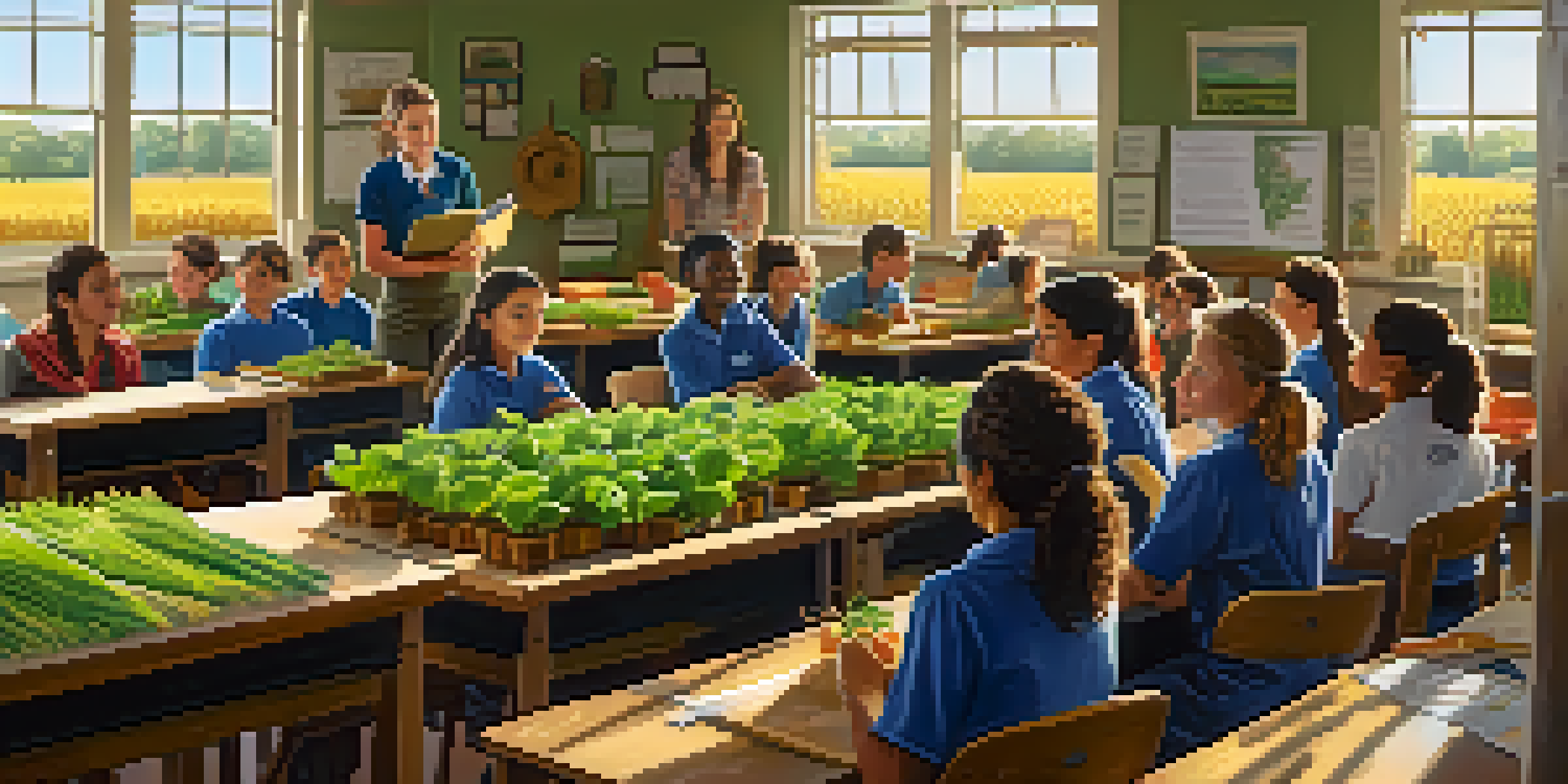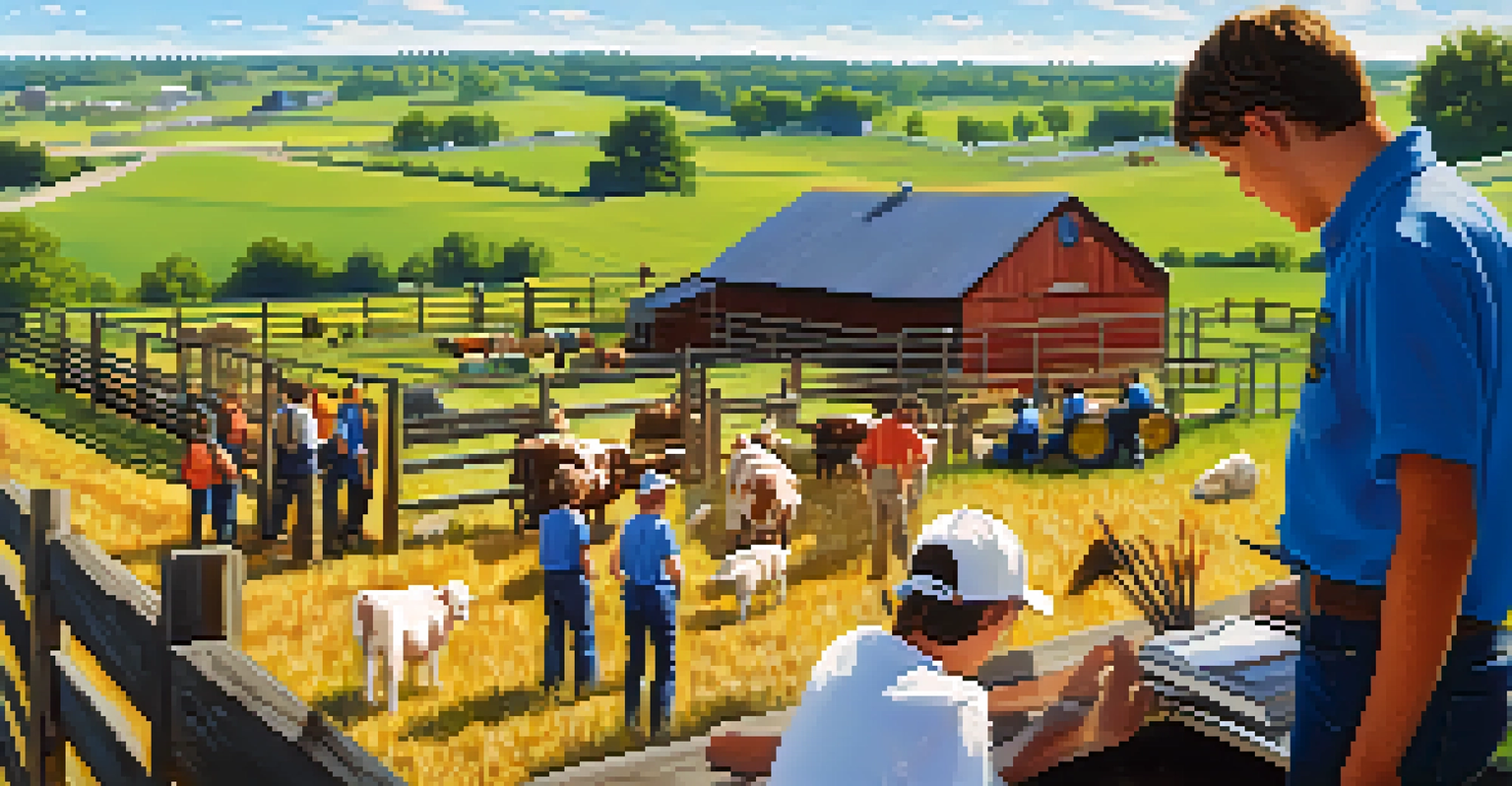Missouri's Agricultural Education and Workforce Development

The Importance of Agricultural Education in Missouri
Agricultural education plays a crucial role in Missouri, a state known for its rich farming heritage. It equips students with the necessary skills to thrive in various agricultural sectors. By fostering a deeper understanding of agriculture, these programs prepare future leaders to tackle industry challenges.
Agriculture is our wisest pursuit, because it will in the end contribute most to real wealth, good morals, and happiness.
Moreover, agricultural education isn't just about farming techniques; it encompasses business management, environmental sustainability, and technology. This multifaceted approach ensures that students are well-rounded and ready for the modern agricultural landscape. As the industry evolves, so must the skill sets of those entering it.
Missouri's agricultural education programs also contribute to economic growth by creating a knowledgeable workforce. Investing in education means investing in the future of agriculture, helping to maintain the state’s position as a leader in the agricultural sector.
Key Programs and Institutions Supporting Agriculture
Several institutions in Missouri are dedicated to agricultural education, including universities and community colleges. The University of Missouri, for instance, offers a comprehensive agriculture program that blends hands-on experience with academic rigor. This combination ensures that students not only learn but also apply their knowledge in real-world scenarios.

Community colleges also play a pivotal role by providing accessible education and training opportunities. Programs at these colleges often focus on specific skills needed in local agricultural sectors, catering to both traditional and emerging fields. This localized approach benefits both students and the community, fostering a skilled workforce tailored to local needs.
Agricultural Education Drives Growth
Agricultural education in Missouri equips students with essential skills, fostering a knowledgeable workforce that contributes to economic growth.
Additionally, partnerships between educational institutions and agricultural businesses enhance these programs. By collaborating on curriculum development and internships, these partnerships ensure that students are gaining relevant experience while also meeting the demands of employers.
Innovative Approaches in Agricultural Education
Missouri is at the forefront of integrating technology into agricultural education. From precision farming to agri-tech innovations, educators are incorporating the latest tools into their curriculum. This not only keeps students engaged but also prepares them for a tech-driven future in agriculture.
The future of agriculture is in the hands of our youth; we must educate them to be our leaders in innovation and sustainability.
For example, virtual reality (VR) is being used to simulate farming environments, allowing students to practice skills in a safe and controlled setting. These innovative methods make learning interactive and can significantly enhance understanding. By embracing technology, Missouri's agricultural education programs can attract more students and better prepare them for the workforce.
Furthermore, hands-on learning experiences, like field trips and internships, complement classroom instruction. This real-world exposure helps students understand the practical applications of their studies, making them more competitive in the job market.
The Role of FFA in Agricultural Development
The Future Farmers of America (FFA) is a vital organization in promoting agricultural education in Missouri. Through various programs and competitions, FFA encourages students to develop leadership and communication skills essential for success in agriculture. This involvement not only enhances their educational experience but also builds a strong sense of community.
FFA chapters across Missouri provide students with opportunities to engage in hands-on projects, ranging from livestock management to sustainable farming practices. These experiences help students apply classroom knowledge in practical settings, fostering a deeper connection to agriculture. Moreover, students often showcase their skills at local, state, and national competitions, gaining recognition and confidence.
Innovative Learning Enhances Engagement
The integration of technology, such as virtual reality, in agricultural education makes learning interactive and prepares students for a tech-driven industry.
Additionally, FFA promotes advocacy for agriculture, teaching students the importance of being knowledgeable leaders in their communities. This focus on leadership ensures that future generations are well-equipped to address the challenges facing the agricultural industry.
Strengthening Workforce Development Initiatives
Missouri emphasizes the importance of workforce development initiatives to address the skills gap in agriculture. Programs aimed at bridging the divide between education and employment are crucial for creating a skilled workforce. This focus helps ensure that students are not just learning but are also prepared to enter the job market post-graduation.
Collaboration between educational institutions and agricultural employers is key to these initiatives. By identifying specific skill sets required in the industry, programs can be tailored to meet those needs. This alignment between education and industry demands is essential for fostering a workforce that can adapt to evolving agricultural practices.
Moreover, apprenticeships and mentorship programs provide students with invaluable experience. By working alongside seasoned professionals, students can gain insights into the industry, enhancing their employability and confidence as they transition into their careers.
Challenges Facing Agricultural Education in Missouri
Despite its successes, Missouri's agricultural education sector faces several challenges. One significant issue is the declining interest in agricultural careers among younger generations. As urbanization increases and fewer students grow up on farms, there’s a growing disconnect with the agricultural industry.
Additionally, funding for agricultural education programs can be inconsistent, impacting their ability to provide quality instruction and resources. Schools often struggle to secure the necessary materials and facilities to offer comprehensive programs. This lack of investment can hinder the development of effective educational initiatives.
FFA Cultivates Leadership Skills
The Future Farmers of America (FFA) plays a key role in promoting agricultural education by developing leadership and communication skills in students.
Lastly, keeping the curriculum relevant amid rapidly changing agricultural practices is a continuous challenge. Educators must constantly adapt to new technologies and methods to ensure students are learning the most current practices, which requires ongoing professional development and support.
Future Directions for Agricultural Education
Looking ahead, Missouri's agricultural education system is poised for growth and innovation. There is a clear emphasis on incorporating sustainability and environmental stewardship into educational programs. This shift reflects a broader industry trend towards sustainable practices, ensuring that future farmers are prepared to meet modern challenges.
Furthermore, enhancing outreach efforts to urban students could spark interest in agricultural careers. By showcasing the diverse opportunities within agriculture, educators can attract a wider range of students. Engaging with communities through workshops and events can also raise awareness about the importance of agriculture in everyday life.

Finally, ongoing collaboration between educators, industry leaders, and policymakers will be crucial for sustaining and advancing agricultural education. By working together, these stakeholders can create a robust framework that supports the development of a skilled and knowledgeable workforce for Missouri's agricultural future.